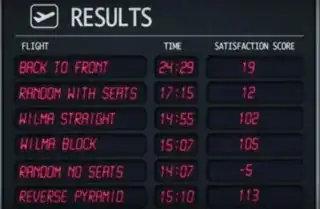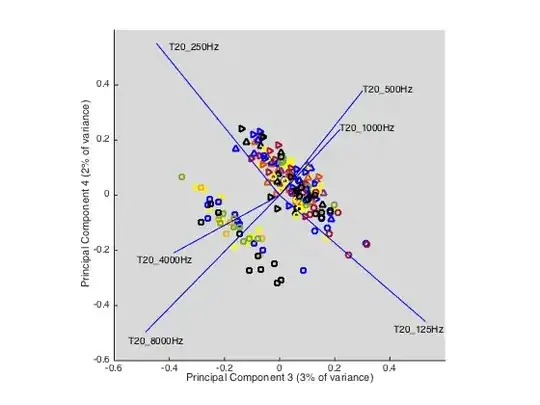Most airlines board passengers starting from the back of the plane and then working their way towards the front (after boarding priority classes and passengers).
In an episode of Mythbusters, Adam and Jamie tested the myth that the boarding strategy favoured by most airlines, back to front, is the least efficient.
The myth was confirmed, and these were the results:
The random no seats strategy is the fastest, followed by the WILMA straight strategy. However, random no seats strategy gives the lowest satisfaction scores.
The highest satisfaction score is given by the reverse pyramid strategy even though it is the fourth fastest.
How might one determine the optimal boarding strategy based solely on times and satisfaction scores given (not including advanced stuff like computing expected aisle or seat interferences)?
I can't seem to think of any kind of unit conversion except to convert the time to seconds and then multiply it with satisfaction score so it's like we're trying to maximise the product of time and satisfaction score:
$$f(t,s) = ts$$
What are some of the advantages or disadvantages of doing this?
One disadvantage seems to be that ranking by product of time and satisfaction score gives the same ranking by satisfaction score.
What else could be done? All that seem to come to mind are products so perhaps I might maximise anything like these:
$$f(t,s) = t^2s$$
$$f(t,s) = ts^{1/2} \text{(eliminating random no seats)}$$
$$f(t,s) = t(s-s_{ave})$$
I'm thinking we're going to have to relate time and satisfaction score to some unit such as money. So, one would have to find some relationship (for example, a linear relationship through linear regression) between boarding time and cost and then another between satisfaction score for boarding today and revenue from flight next month?
Does it have to be something like that?
I was suggested z-score so I tried standardising or something:
Why did the sum of squares of z's turn out to be 6 for both? Did I do something wrong? Is that the fourth moment of standard normal or something?

